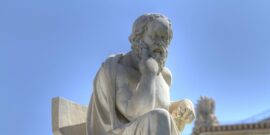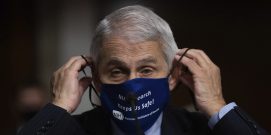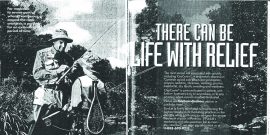If American society is to let go of its resentment and rage, it must learn to forgive.
Richard Gunderman
In Gulliver’s Travels, immortality leads not to the perfection of the virtues, but to their most extreme corruption.
If the liberal arts are indeed good for the soul, they should be taught to people of all ages.
In a future pandemic, truth must be at the heart of any mitigation strategy.
The buzz around the weight-loss drug Ozempic threatens to distort our understanding of human desire and self-control.
King approached racial justice very differently from modern-day activists, stressing the dignity of all human beings.
The ideological life, the epitome of the unexamined life, is not worth living.
The ideological naïveté that we sometimes see in medicine is a symptom of a deeper problem with how we educate medical students.
A professional education requires an understanding of the human condition that only humane study can provide.
Perhaps no novel explores the personhood of woman better than Leo Tolstoy’s Anna Karenina.
Lillian Gilbreth, who died just over fifty years ago, saw that the worker could not be understood as a cog in the machine.
Sam Bankman-Fried's commitment to the principles of effective altruism didn't prevent his mind from being warped by the love of money.
Some people will defend their victimhood at any cost.
Gifts can have complex consequences, but that is no reason to discourage generosity.
Efficiency has its benefits, but physicians must never forget that their job is to care for human beings.
Celebrity culture draws us away from the things we most need to attend to, and toward the shallow, insincere, and insubstantial.
Ten years after her passing, Ostrom's work remains vital.
Statistics can enlighten us, but to regard statistics as the best or only window on human reality is to engage in an essentially dehumanizing project.
Jonathan Haidt seeks technological solutions to fallen human nature.
No government program or battle plan can be as morally significant as the suffering of a child.
Putin thinks he is control. Another Russian, Leo Tolstoy, can remind us that so-called great men do not write the story of history.
Stephen Toulmin saw that great literature can account for things that the social sciences can't.
According to the Effective Altruism movement, no one should give to a local church, art museum, or school.
What does the Cathedral of Christ the Savior commemorate today?
Many addictions can be traced to policies and practices established by trusted professional organizations.
Vaccines have always been controversial. We must continue to stress their benefits, while respecting the concerns and convictions of our fellow citizens.
We should take care lest our focus on superficial characteristics blind us to the human being beneath the surface.
We need lawyers to represent clients whose causes are in disfavor with the public.
The tradition of professionalism is absent in the ABA's recommendations to improve the well-being of lawyers.
Is AI a threat to human liberty?
Montessori education cultivates independence and liberty into children by treating them as distinct individuals.
Franz Boas, G.K. Chesterton, and Pope Pius XI all criticized lumping people together into categories according to biology.
Intelligence tests are a highly imperfect means of promoting a highly questionable end.
Malthus's shadow still looms large, influencing biology, environmentalism, economics, and other disciplines of knowledge today.
When we put a tablet in the hands of a small child, we are unwitting accomplices to the soft despotism that Tocqueville predicted.
In Darwin’s scheme, there can be no noble or ignoble, no virtuous or vicious, and ultimately no high and low.
China’s rulers have failed to admit that, with their family policy, they are tinkering with matters beyond their ken, let alone their control.
250 years after his birth, Robert Owen's attempted utopia of New Harmony, Indiana shows the limits of socialist idealism.
Confronted with the fragility of human life, Walt Whitman did not turn his back but looked it directly in the eye.
Once marriage comes to be regarded primarily as a contract, its fate is sealed.
For Levinas, situations in which human beings deal with one another facelessly entail moral peril.
A student is not an empty vessel. To find wisdom, or perhaps to be found by wisdom, it is necessary to be actively engaged in its pursuit.
Dickens’ tale is so effective because, in the words of Chesterton, it is targeted not at institutions but “an expression of the human face.”
When Jane Jacobs analyzed the great Chicago heat wave, she saw conditions were ripe for sliding into a cultural dead end.
As Edward Bernays saw it, a healthy democratic society required the regulation of the beliefs of the many by the work of an unseen few.
Reality having ceased to provide a standard by which to evaluate statements, it is replaced by the speaker, who seeks merely to be true to himself.
Richard Gunderman, MD, PhD, is Chancellor's Professor of Radiology, Pediatrics, Medical Education, Philosophy, Liberal Arts, Philanthropy, and Medical Humanities and Health Studies at Indiana University. His most recent books are Marie Curie and Contagion.












































